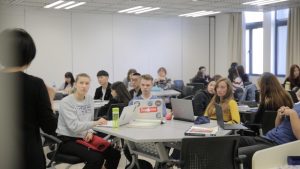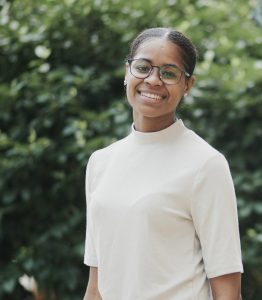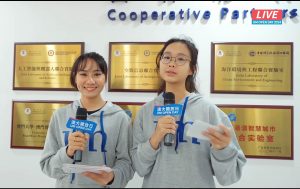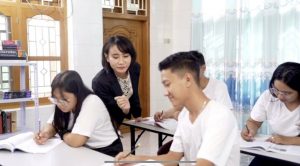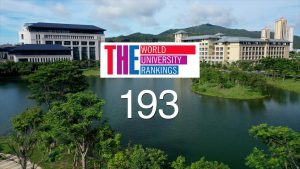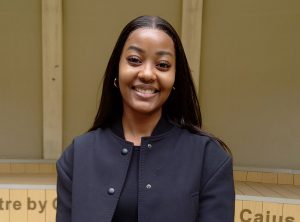As a university committed to enhancing the global competitiveness of its students, the University of Macau (UM) has forged partnerships with higher education institutions worldwide to enrich students’ international exposure. The university has also established cross-cultural and interdisciplinary teaching and research platforms to attract outstanding international students. These diverse initiatives provide opportunities for students to integrate knowledge from different disciplines and explore interdisciplinary studies, thus preparing them for success in an interconnected global landscape.
Nurturing talent through international collaboration
UM has embraced an international educational model since its establishment. Guided by its ‘4S’ internationalisation strategy (Strategic, Substantial, Specific, and Sustainable), the university, in recent years, has placed increased emphasis on strengthening cooperation with universities in China and overseas, so as to establish alliances, launch collaborative talent development programmes, and improve its academic standing and research quality. Specifically, UM has strengthened its ties with universities in mainland China, Portuguese-speaking countries, English-speaking countries, European countries, and the Asia-Pacific region, including Singapore, South Korea, Japan, and Malaysia. Its efforts in expanding global cooperation have garnered recognition both nationally and internationally.
Currently, UM has signed cooperation agreements with nearly 300 higher education institutions across over 35 countries and regions, and UM students can choose from more than 160 of these institutions for study through exchange programmes or collaborative talent development initiatives. The university has worked with world-renowned universities to nurture high-calibre talent in fields such as microelectronics, pharmacology, robotics, ocean science, biomedical sciences, materials science, and finance. These universities include the Queen’s University Belfast, Imperial College London, the University of Bristol, the University of Edinburgh, the University of Porto, the University of Lisbon, Temple University, Fudan University, and Zhejiang University. Through these programmes, students can enhance their professional knowledge, cultivate innovative thinking, and elevate their global competitiveness.
Creating unique cross-cultural learning experiences
Located in Macao, a city with unique historical background, UM has been an academic bridge between Eastern and Western cultures. The university boasts a diverse student body, with students from more than 50 countries and regions now pursuing degree programmes, in addition to exchange students from around the globe. Many of these international students come from Portuguese-speaking countries. They are passionate about Chinese culture and aspire to discover China through UM. For example, the Confucius Institute at UM offers Chinese language courses to enable international students to learn Chinese and gain a better understanding of Chinese culture. Meanwhile, the Department of Portuguese, the Department of English, the Chinese-Portuguese Bilingual Teaching and Training Centre, the Centre for Japanese Studies, and the English Language Centre of the Faculty of Arts and Humanities (FAH) offer professional training and programmes to improve students’ cross-cultural awareness and skills, empowering them to become multilingual and cross-cultural professionals.
Nara Adisa Vaz from Cape Verde is among the international students who were attracted to UM due to its exceptional educational environment. She is currently a second-year master’s student in FAH majoring in Chinese-Portuguese translation. Aspiring to become a Chinese-Portuguese translator working in diplomatic or business settings, she recognises the importance of mastering native language and cultural skills, particularly in a city where the mother tongue of its citizens is typically Chinese. Nara explains, ‘Macao’s unique cultural context, combined with the academic atmosphere and learning environment at UM, has allowed me to learn more about traditional Chinese customs, philosophical thoughts and etiquette, as well as the Chinese society and the Chinese market, thus improving my competitiveness.’
Ei Thazin Tun, an international student from Myanmar, is a first-year master’s student in the Faculty of Education (FED). Recently, she served as a host and introduced UM in fluent English during the live stream of UM Open Day 2024. Although she has only studied at UM for one semester and has limited proficiency in Chinese, she partnered with two other hosts who spoke Mandarin and Cantonese respectively and delivered an outstanding performance. For her, hosting the live stream was a unique cross-cultural learning experience. She shares, ‘During the preparation of the live stream, we overcame language barriers arising from our different linguistic backgrounds and established a strong partnership through mutual learning. This experience also allowed me to gain deeper insights into the multicultural nature of the UM campus.’
Providing an interdisciplinary platform for faculty and students
With its exceptional academic resources, UM not only supports its faculty in pursuing teaching innovations, but also nurtures its students to become interdisciplinary talent. The university offers a wide range of interdisciplinary programmes and has established interdisciplinary research platforms focused on cognitive and brain sciences, artificial intelligence and robotics, as well as data science. These initiatives empower faculty and students to conduct interdisciplinary research and delve deeper into problems that require integrative analysis. As a member of the Applied Linguistics, Language, and Literacy Lab at UM, Thazin conducts interdisciplinary research under the guidance of her supervisor Barry Reynolds, an associate professor in FED. Her study utilises eye-tracking technology to investigate patterns of English vocabulary learning. In fact, before studying at UM, Thazin founded an English language training centre (which is a Cambridge English exams preparation centre) in Myanmar, with the goal of nurturing English talent for her country. Therefore, Thazin anticipates applying the results of her research to enhance the teaching of English as a second language.
Thazin says, ‘Our faculty encourages us to enhance teaching quality through research, which is very inspiring,’ She emphasises that UM is a university with rigorous academic standards and an environment that encourages innovation in teaching and research. Moreover, UM has achieved remarkable progress in recent years and its international reputation continues to grow. Notably, the university ranks 193rd in the Times Higher Education (THE) World University Rankings 2024, and it has a high ranking in the field of education (UM’s education subject ranks 126th-150th in the THE World University Rankings 2024 by Subject). Thazin believes that she will thrive in this progressive academic environment.
Meury Ferreira from Angola, a fourth-year international student in UM’s Faculty of Health Sciences, is pursuing a bachelor’s degree in biomedical sciences, a discipline that integrates life sciences and medicine. This discipline provides Meury with a lot of opportunities to engage in interdisciplinary research. She conducts drug testing and collects research data every week at the Ministry of Education Frontiers Science Center for Precision Oncology in the university’s Scientific Research Base. Meury’s aspiration is to become a medical scientist and improve Angola’s medical standards. She says, ‘Many of the studies carried out by the UM team have attracted the attention of the international academic community. I receive high-quality training here and have access to advanced instruments in my daily studies. These will be very important for my professional career development in the future.’
Further strengthening its international educational model
With its unique history and culture as well as economic vitality, Macao has attracted students from around the world over the years. Among local educational institutions, UM stands out as the preferred choice for outstanding international students due to its international educational model. Building upon its substantial achievements in academic exchanges and collaborations with world-class universities, UM will continue to expand its global cooperation and enrich its international academic environment.
Text: Kelvin U, UM Reporter Wang Chuyue
English translation: Bess Che
Photos: Editorial board, with some provided by the interviewees
Source: My UM Issue 130

